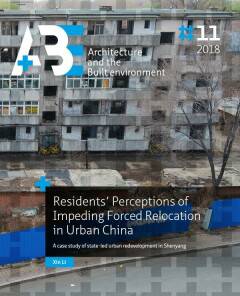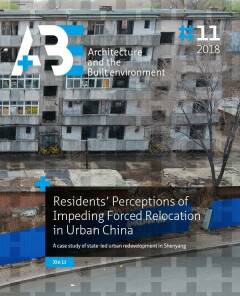
- Afhalen na 1 uur in een winkel met voorraad
- Gratis thuislevering in België vanaf € 30
- Ruim aanbod met 7 miljoen producten
- Afhalen na 1 uur in een winkel met voorraad
- Gratis thuislevering in België vanaf € 30
- Ruim aanbod met 7 miljoen producten
Zoeken
Residents’ Perceptions of Impending Forced Relocation in Urban China
A case study of state-led urban redevelopment in Shenyang
Xin Li
€ 29,95
+ 59 punten
Omschrijving
Since 1978, urban redevelopment in China has resulted in large-scale neighbourhood demolition and forced residential relocation, which can severely disrupt established people-place interactions in the demolished neighbourhoods. This issue of A+BE conceptualises forced relocation as a process and as a specific type of residential mobility that occurs in the context of urban restructuring. It suggests a conceptual model to show the sequence of events that households experience
during urban redevelopment, by dividing forced relocation into three stages: the pre-demolition stage, the transitional stage and the post-relocation stage. This conceptual model helps to reduce the distraction caused by the accumulation of the dynamics of relocatees’ experience as the urban redevelopment proceeds over time, by capturing the sequence of the events that occur to relocatees during urban redevelopment. We used the model to structure the analysis of the literature review and subsequently identify the gaps in the literature that should be addressed in future forced relocation studies about China. We discovered that the experiences of relocatees from household and residential mobility perspectives reveal the dynamic, variable and complex nature of forced relocation, which makes forced relocation in urban China not necessarily equivalent to displacement.
during urban redevelopment, by dividing forced relocation into three stages: the pre-demolition stage, the transitional stage and the post-relocation stage. This conceptual model helps to reduce the distraction caused by the accumulation of the dynamics of relocatees’ experience as the urban redevelopment proceeds over time, by capturing the sequence of the events that occur to relocatees during urban redevelopment. We used the model to structure the analysis of the literature review and subsequently identify the gaps in the literature that should be addressed in future forced relocation studies about China. We discovered that the experiences of relocatees from household and residential mobility perspectives reveal the dynamic, variable and complex nature of forced relocation, which makes forced relocation in urban China not necessarily equivalent to displacement.
Specificaties
Betrokkenen
- Auteur(s):
- Uitgeverij:
Inhoud
- Aantal bladzijden:
- 174
- Taal:
- Engels
- Reeks:
Eigenschappen
- Productcode (EAN):
- 9789463660389
- Verschijningsdatum:
- 1/06/2018
- Uitvoering:
- Paperback
- Afmetingen:
- 190 mm x 235 mm
- Gewicht:
- 413 g

Alleen bij Standaard Boekhandel
+ 59 punten op je klantenkaart van Standaard Boekhandel
Beoordelingen
We publiceren alleen reviews die voldoen aan de voorwaarden voor reviews. Bekijk onze voorwaarden voor reviews.











